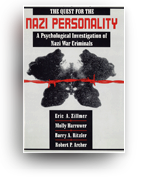 |

Open to Interpretation…The Art and Science of Inkblots
Ashland, OH: Hogrefe, 2009
[more]
............................................
Principles of Neuropsychology
Belmont, CA: Wadsworth, 2008
[more]
............................................
Military Psychology: Clinical and Operational Applications
New York, NY: Guilford, 2006
[more]
............................................
The Quest for
the Nazi Personality
Hillsdale, NJ: Lawrence Erlbaum Associates, 1995
............................................
Neuropsychological Assessment and Intervention
Springfield, IL: Charles Thomas, 1992
[more]
|
 |
|
 |
 |
 |
THE QUEST FOR THE NAZI PERSONALITY:
A Psychological Investigation of Nazi War Criminals

Eric A. Zillmer, Molly Harrower, Barry A. Ritzler, & Robert P. Archer
Hillsdale, NJ: Lawrence Erlbaum Associates, 1995
|

How did they do on their IQ tests?
These were all high-ranking officers or politicians at the Nuremberg trials. Out of the 21 people, three had Ph.D.'s and many were very well educated. The mean I.Q. for the 21 defendants was 128, falling into the superior to very superior range. Herman Göring had an IQ of 138, which is very bright. He was delighted with his results, but was furious to later discover that Schacht and Arthur Seyss-Inquart had both beaten him. He then claimed the test was unreliable. Of course, the IQ test doesn't say anything about morality. The fact that the Nazi elite scored high on U.S. intelligence tests did not go over well with the U.S. personnel in charge of the defendants and the results were not publicly announced until much later.
Next Question...
|
|